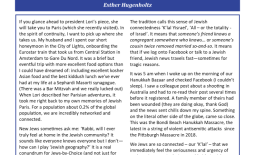Erev Rosh HaShanah Sermon 5784
I invite you to cast back your mind to your first conscious memory of being in synagogue.
It could be an early childhood memory, sitting next to a parent or grandparent. Maybe you came for the first time when you were exploring your Jewish heritage in college and knocked on the door of your local Hillel. Perhaps you had just moved town and it was time to start prepping for your Bar or Bat Mitzvah. Or, you nervously googled ‘local synagogue’ and sent your first email.
Whatever your Jewish backstory is, think of what that experience was like. What you felt, what you noticed, what happened when you put your foot across the threshold.
I remember my first time coming to synagogue. This was back in the days of the Primitive Internet, so to say, and I had stumbled across a progressive community called ‘Beit ha’Chidush’, ‘House of Renewal’, in Amsterdam.
The website mentioned they had American expats and I have always had an unexplainable affinity with the American people, and I figured they might be a convivial bunch.
Nervously, I picked up the phone and before long, I anxiously walked through the door.
My first impressions? It was a cold, wet, dark November and I picked my way through slick, narrow Amsterdam streets. I found a seat and I saw a close-knit group of people; how would I even talk to them? My confusion at the Hebrew and the rituals was utterly complete. The only piece of liturgy I recognized was the Sh’ma.
I almost ran away after the service. I had suffered loss and trauma and hearing the Sh’ma was triggering to me. Belief in God was a no-go area but still I felt a pull to visit a synagogue. How could I possibly affirm the Oneness of a God Who had let me down only a few years prior when my brother had died? There was a storm raging in my head and I didn’t understand why I was there.
Then, a petite, kindly lady with pepper-and-salt curls and bright eyes appeared next to me. ‘You don’t have to believe in God; you are welcome here.’
‘You are welcome here.’ Those words changed my entire life.
Let’s revisit the question more openly: remember – you are welcome here.
What is your first memory of synagogue really like?
Did you feel fear, anxiety, joy, trepidation, excitement, yearning, a sense of homecoming, love, confusion…? Any or all of these feelings are legitimate. In fact, we may feel them now.
Being Jewish is complicated. Being Jewish today feels increasingly more complicated. And the High Holidays are pretty complicated too.
As a non-athletic person, I always think of the High Holidays as a marathon. If I would have to get up now and run a 5K (bonus points for doing it in robe, kittel and tallit!), I would have a suboptimal experience.
Still, we find ourselves here, in a kind of ‘spiritual marathon’—yearning for something, looking for something, trying to root ourselves in something, but also not trying to trip over our own emotions, or sense of inadequacy, trying to keep pushing through but also wondering how or why we should be reaching the so-called finish line.
The first port of call should be for us to acknowledge where we find ourselves, and for each of us, this could be a slightly different emotional landscape. To check in with ourselves. To breathe deeply and just be in this present moment, taking in our surroundings and settling our souls.
What are we letting go this past year, or years?
What pain and loss, shock and adjustment has been our traveling companion through the years of COVID, climate change and more?
How has the passing of time and the shifting of generations affected us?
Do we feel stronger or more frail?
Do we have deep worry or burgeoning hope?
Do we feel close or distant from the people who matter?
Can we touch these moments of transcendence and transformation that this season promises us?
We breathe and feel the weight of our machzor in our hands, the foundation of music and prayer, of memory and anticipation.
We have arrived again at the doors of the synagogue, the gates of repentance and we have just stepped over the threshold.
And you are welcome here.
This is why ‘Ashreinu’ is our High Holiday theme this year, so we can move from the ‘oy’ to the ‘joy’.
‘Osher’, or ‘happiness’, from which we derive the word ‘Ashreinu’, is an odd Hebrew word to translate.
It doesn’t mean ‘happiness’ in a frivolous sense; it is neither fleeting nor indulgent. Rather, it is happiness with profundity: a co-mingling of one’s awareness of good fortune, gratitude and sense of blessing. It is a rooted joy, grounded in covenant and connection, perspective and purpose.
We know this word from many instances of liturgy, including the Ashrey prayer (Psalm 145): ‘Ashrey yoshvei veitecha… ashrey ha’am she’kachah lo…’ – ‘fortunate are those who dwell in Your house… fortunate is the people whose lot is thus…’.
However, I was inspired by a lesser-known passage from the morning service: ‘ashreinu mah tov chelkeinu, u’mah na’im goraleinu u’mah yafah yerushateinu’ – ‘Ashreinu – how fortunate are we – how goodly our portion, and how pleasant our lot and how beautiful our heritage.’
If you say it fast, you will hear the poetic cadence of the words but you also run the risk of missing their layers and subtleties. We will explore these layers together the next coming ten days. And we will discover what joy we can find in our Jewishness. Jewish joy is so much more than a glib marketing phrase or a hashtag. It is an act of exuberant resilience, like a torch against the night.
Jewish joy is us all here, gathered together, in community.
Every single one of us has a reason to be here and has a story to tell. All of us are part of that larger story that we are telling as a collective, through past, present and future.
We tell the stories of our ancestors, figuratively and literally, we tell the story of ourselves, our descendants and our dreams.
Through the story of a reluctant Abraham who inflicts such cruelty on both Isaac and Ishma’el, we confront the darkness in our own family dynamics and our shortcomings as parents.
Through the tears of Channah praying for a child, we sit with the precarity of life and wrestle with the things beyond our control.
The reminds us of our mortality and triggers us to react, perhaps reject, perhaps embrace our great calling to make meaning out of our fleeting existence.
The Yizkor memorial service allows us to remember tenderly those who are no longer with us.
However, if this is where the story would end, how compelling and relevant to our lives would it be?
The High Holidays knock on the doors of our hearts. Like the ‘ShulKlopfer’ of the shteitlach of yore, we hear the pounding at a late and unexpected hour.
We sense the urgency. We are told to rouse: not just by our tradition or by our conscience but by the circumstances we inhabit. The High Holidays are a temple in time, but they also inhabit this plane of existence. Deep and abiding Jewish joy would indeed atrophy into a fleeting frivolity if it would fail to address the human condition.
So I invite you to cross over another threshold in your mind. This time, we are not entering the synagogue but we are entering the world.
What concerns you most?
What is the future you fear or the tomorrow you dream of? What are the questions in your own life you would like to address?
The Jewish tradition does not pretend that it has trite answers, but it does have thoughtful responses.
To me, this is no theoretical exercise.
I remember so well the solace and joy I found in my Judaism during the depth of the pandemic.
Every time I put on a mask, I considered it a mitzvah, not unlike enshrouding myself in my tallit.
And upon the vaccine entering into my arm, I had the Shehecheyanu blessing – the prayer for all momentous new things – pouring from my lips.
When the world was plunged in isolation, it was Shabbat that kept me tethered to my family and the human family.
It was prayer that soothed my anxious soul, and may prayer soothe yours.
The question this season poses is not just how Judaism can impact our lives but how our lives inform our Judaism.
Surely, the revolutionary message of Shabbat rest helps us navigate our devices and the never-ending demands of our world.
Jewish joy are bursts of mundane inspiration that we find in our lives, the eternal optimism of our tradition that reminds us to put one foot in front of the other and to keep on asking the questions.
Ashreinu – how fortunate are we to find comfort, warmth, solace, accountability, justice and resilience in the pockets of our Judaism, the cracks and crevices of our lives.
Whatever emotions accompanied us across the threshold and into this space, we are here, and our journey into the sacred starts tonight.
You are invited to look at yourself, to look at each other, to look around and release the outside world, and fall in love a little with our joyful Jewish life.
Ashreinu.




